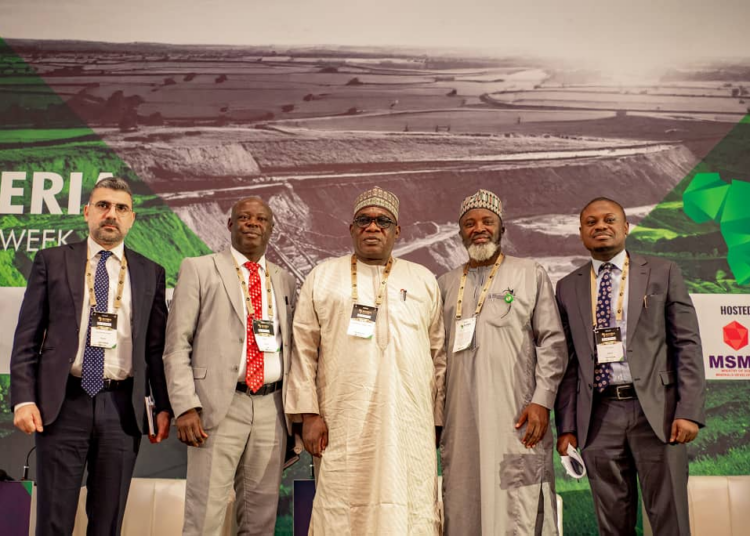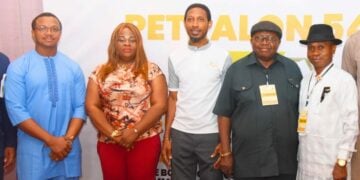Experts in the minerals and mining sector have insisted that Nigeria must invest heavily in mineral exploration and in generating geoscience data in order to attract global mining giants to the country.
The experts, drawn from the private and public sectors, who spoke during a panel discussion at the recently concluded Nigerian Mining Week in Abuja, described the mineral-rich but abandoned sites of the past due to discovery of oil as Brownfields, while the new mining sites which came into existence as a result of efforts to revitalise the mining industry are termed Greenfields
Habeeb Jaiyeola of PricewaterhouseCoopers International Ltd (PwC), who anchored the session, said that now, more than ever, is the time for Nigeria to rethink strategies for optimizing its Greenfield and Brownfield mineral potential.
On his part, the chief executive officer, Titan Minerals Nigeria, Fadi Abou Ghazale, underscored the importance of data generation in attracting investors to the sector.
While noting that mining is largely private sector-driven while government is the regulator, he underscored the need for the organised private sector to invest in mineral exploration in order to discover more minerals in both Brownfield and Greenfield potential areas.
Ghazale, however, expressed concern that exploration funds are very difficult to get, and encouraged the government to do more to address the challenge.
Ghazale, who revealed that his organisation was currently executing mineral exploration projects in Nigeria and Africa, urged Nigeria to create an enabling environment for junior investors to make the Greenfields and Brownfields more attractive to global investors.
“Rio Tinto and other giants in that category are not eager to invest funds in any kind of exploration. They only invest in projects that have been developed to certain levels, and Nigeria will not be an exception. So, until Nigeria attracts the global junior exploration companies (mostly listed) who will begin to explore and de-risk the potential mineralised areas, Rio Tinto and the others will not invest in Nigeria,” he said
According to him, only when this is done will economic mineral discoveries be made and this is the only way to attract Rio Tinto and other mining giants.
Ghazale also encouraged the Federal Executive Council, Senate and House of Representatives to work together to ensure more investment in the generation of geoscience data needed to de-risk the sector.
“Exploration funds are very difficult to get and I think the government of Nigeria should invest in the generation of credible geoscientific data to make Nigeria more attractive to the international investment community”
“When such is done, chances are high that there would be beautiful stories of mineral discoveries with economic attributes. At this stage, the potential of the Greenfield and Brownfield minerals assets of Nigeria will become attractive to the global juniors, which will be able to raise funds at the capital market or international market for big-time exploration projects in Nigeria.
“Once geoscience data is available, the juniors will be attracted to the assets, and they will aim to take these discoveries to the next stage of pre-feasibility (PFS) and definitive feasibility studies (DFS).”
On how competitive it is to attract junior investors to any country, Ghazale said: “It is good that Nigeria wants the juniors to come and invest, but we have to put ourselves in the shoes of these juniors. The juniors are businesses, and they want sufficient assurance that they are putting their money where they will be able to get good returns.
He pointed out that Nigeria was not the only country with mineral resources, and it must, therefore, compete for the juniors by financially enabling the private sector, which will invest in exploration and make the assets more attractive for foreign direct investors.
For his part, the director general of the Nigeria Mining Cadastre Office (MCO), Simon Nkom, submitted that digitising mineral licensing by the MCO was pivotal to creating an investment friendly climate. He recalled that the government dissociated itself from participating in mining, noting that in the past, it was involved in mining through the Nigerian Mining Corporation and the Nigerian Coal Corporation.
He, however, said there some Brownfield assets had remained unsold and still belong to the government, stating that MCO protects them, including some 42 billion tonnes of bitumen reserves, among others.
Nkom recalled that in 1940, Nigeria was a globally known exporter of tin, coal and columbine. He encouraged investors to also concentrate on the Greenfield assets despite the existing legacy assets, noting that they will also make huge mineral discoveries.
The director general, Bureau for Public Enterprises (BPE), Ayodeji Gbeleyi, who spoke through Ahmed Abdulkadiri, director, Agriculture and Natural Resources, explained that existing geodata on Brownfield are results of exploration carried out by foreign companies at the time, adding that the companies had the expertise and funds to execute the task.
“After the nationalisation of the assets, the government owned the data,” he said, adding that Nigeria has been unable to conduct further studies on the assets. “There must be a deliberate attempt by the government to generate data for the assets.”
Ghalaze stressed that data is key information needed by investors to make informed investment decisions in the mining sector.
He lamented that the dearth of data has remained a major obstacle to executing the government’s policy of concessioning some assets.
“While trying to concession the Brownfield assets, we needed firsthand information on data and engaged the MCO and the National Steel Raw Materials Exploration Agency (NSRMEA), Kaduna, but we could not lay hands on the geoscience data we needed to concession the assets.”
Gbeleyi noted that the fact that Nigeria does not have readily available data on its Brownfields made it difficult for the Nigerian government to collaborate with competent international companies that could have helped to develop those assets.
For his part, the director-general of the Nigerian Geological Survey Agency (NGSA), Prof Olusegun Omoniyi Ige, said his Agency was aware that the British Geological Survey had explored Nigeria for geoscience data and that the information was domiciled in the NGSA Geodata Centre, which is assessable to the public.
Professor Ige agreed with Fadi Ghazale and Engr. Simon Nkom that the development of Nigeria’s Brownfield and Greenfield mineral assets must be evaluated and estimated in order to eventually harness and develop them.





